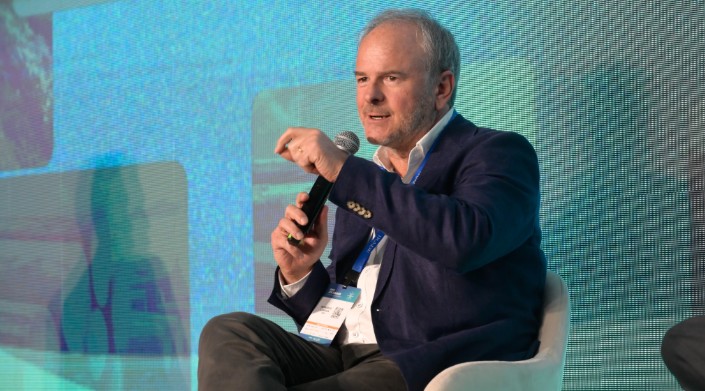“Although CMPC is a company with offices in Santiago, operating in nine countries and managing large projects outside Chile, we also aim to be deeply regional. That’s why we have our corporate offices here, along with many of our operations.” With these words, Bernardo Larraín Matte, President of Empresas CMPC, began his presentation yesterday at the Regional Business Meeting (Erede) in Los Ángeles. This marked his first public appearance in the area since assuming the company’s presidency in April.
During the event, he addressed some of the main challenges facing Chile’s forestry sector.
VALUE CHAIN OF THE FORESTRY INDUSTRY
“We have a pioneering, world-class industry, represented not only by the two major companies you know—CMPC and Arauco—which, of course, are part of this forestry industry ecosystem and are driving the largest investment projects of Chilean companies abroad,” reflected Larraín Matte.
However, he noted that “there are also 26,000 forest landowners—the vast majority with plots smaller than 200 hectares—and 1,125 sawmills, about 800 of which are active, most producing less than 5,000 cubic meters per year.”
The executive also highlighted that there are 256 wood product exporting companies and that the forestry industry generates 300,000 direct and indirect jobs nationwide. In the Biobío region, this figure reaches 30,000 direct jobs.
“This is a business ecosystem with capabilities that go beyond—as some stubbornly claim—just cutting and exporting. They say it as if there were no innovation or added value. That’s why the first thing we must challenge is the concept of extractivism in our natural resource industries,” he urged during the event.
In his view, this notion is “absolutely wrong,” as disproving it would only require “visiting our R&D centers, highly technological fire control and transport fleet monitoring centers, or seeing the equipment and technology in pulp, paper, and sawmill plants.”
SUSTAINABILITY AND OPPORTUNITIES FOR THE SECTOR
Regarding global sustainability challenges, Bernardo Larraín Matte pointed out that “the world demands products made from natural forest fiber and pulp. These products are now part of our production and export matrix and are central to these global challenges.”
He also emphasized innovations enabling new products in areas like biomaterials, biofuels, biodegradable bottles, and even wind turbines.
On leveraging sector opportunities, the CMPC President used the analogy of a “four-legged table.”
The first, he continued, “is Chile’s natural wealth, particularly in this region. Today, an estimated two million hectares are eroding, with no alternative use or reforestation.”
Second and third, he cited “business capabilities” and global demand for national products. “What’s missing? Essentially, the institutional and regulatory capacity the State must provide to enable our economy’s growth,” he argued.
He stressed that Chile’s weakened institutions negatively impact indicators like low afforestation rates, regional unemployment (9.1%), informal labor (25%), and a predominantly pessimistic economic outlook.
Bernardo Larraín advocated for revitalizing the forestry sector through plantations to restore wood availability and reopen sawmills forced to close due to raw material shortages.
“We must start at home by talking more about our industry, reclaiming the importance of natural resources for Chile’s economy and our business capabilities. That’s an unfinished challenge: confronting entrenched myths,” he concluded.
Source:La Tribuna







Comments (0)
No comments yet. Be the first to comment!
Leave a comment